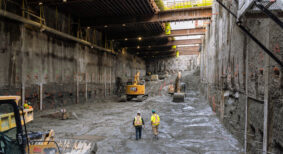The federal government has announced unprecedented investment to renew Canada’s aging public infrastructure. However, there have been delays in rolling out the funds to get the much needed projects off the ground and the deadline for Phase I is approaching fast. The Canadian Construction Association (CCA) has expressed concerns regarding the March 18, 2017 deadline to several government ministers and is advocating for extension.
Since 2000, successive federal governments have invested considerable dollars in supporting the efforts of provincial and municipal governments to renew Canada’s public infrastructure. The most recent federal contribution was announced this fall when Justin Trudeau’s Liberal government dedicated an additional $35 billion to infrastructure, bringing the total federal investment over the next 11 years to $186 billion. When provincial-municipal leveraging is added, more than $300 billion will be spent by all three levels of government to modernize Canada’s aging core infrastructure. In addition to these funds, the federal government has also committed nearly $32 billion to the renewal of federal assets including infrastructure in parks, small-craft harbours and federal buildings across the country.
Lack of Progress
With so many numbers floating around, it is not surprising that many CCA members are increasingly confused by all these announcements, particularly since most members have seen precious little of this announced investment translate into tangible projects at the local level. In fact, the Parliamentary Budget Office (PBO) recently released a rather scathing report critical of the federal government for its lack of progress in rolling out these funds across the country. According to the PBO, 3,866 projects have been identified for funding at a value of $4.6 billion. Of those, only 1,682 projects valued at $333 million are expected to be completed by March 31, 2017. This means that the remaining 1,461 projects valued at $3 billion will be completed by March 31, 2018. How and when the remaining $7.4 billion of the $11.9 billion announced as part of Phase I will be allocated remains a mystery, which is particularly troubling since many of the projects funded under Phase I must be substantially completed by March 31, 2018.
Where’s the Hold up?
To begin, the addition of new money and the decision on the part of the federal government to change the leveraging requirements precipitated the need for new framework agreements with all the provinces and territories. As is often the case, negotiations took longer than anticipated and the last of these agreements were only signed in late summer of 2016. As a result, many of the projects approved for construction were not tendered due to delays in the design and engineering phase.
Complicating matters further has been the slow pace at which some provinces have submitted projects to the federal government for approval. Again, given the federal funding requirements, it is not surprising that the due diligence on the part of provincial and municipal governments have contributed in part to the delays in obtaining funding approvals. As familiarity with the process improves, many of these delays should be eliminated.
Finally, though it is easy to fault the federal government, and most certainly appropriate for delays in tenders for improvements to federal assets, it must be remembered that the federal government with respect to most co-funded projects is simply a funding agent. The federal government is not the tendering authority so it does not control the pace at which projects are ultimately tendered. In the case of water and public transit projects, it is for the most part municipal governments that dictate the pace of construction, so other than the deadline for substantial completion, the federal government has no tools to expedite the tendering process on the part of other levels of government.
Advocating for Extensions
While CCA appreciates the need to expedite construction, the use of the federal deadline has in some cases forced municipal tendering authorities to attach severe liquidated damages penalties to many of the Phase I projects. With so much additional Phase I work yet to be awarded, this could force many contractors to build into their price additional labour or risk premiums, thereby increasing prices and reducing the amount of infrastructure purchasable from these fixed budgets.
CCA has expressed concerns regarding the deadline to several government ministers and continues to advocate for a reasonable extension for projects that experience unavoidable delays or are required to use unrealistic project schedules to satisfy the federal substantial completion deadline of March 31, 2018.
Michael Atkinson is the president of the Canadian Construction Association. If members are aware of projects that should receive a reasonable extension, please contact Bill Ferreira of CCA at bferreira@cca-acc.com.










Have the extensions been granted?